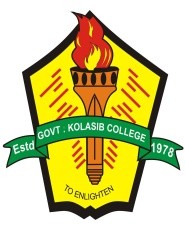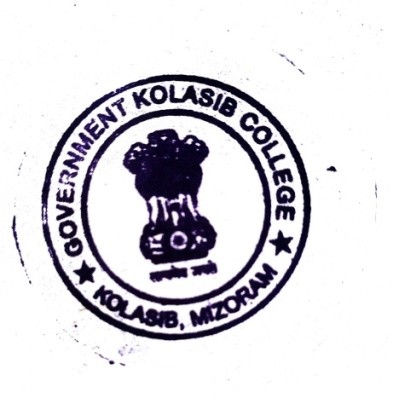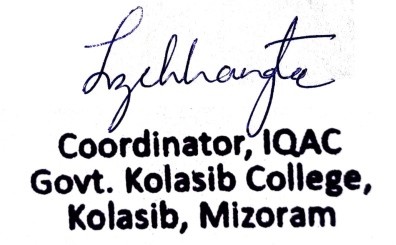
GOVERNMENT KOLASIB COLLEGE
BEST PRACTICES SUCCESSFULLY IMPLEMENTED BY THE INSTITUTION FOR THE ACADEMIC YEAR 2023-2024
BEST PRACTICE- I
Title of the Practice: Green Initiatives-Save Tuichhuahen Project
Objectives:
1. To enhance environmental consciousness among the student body.
2. To motivate students to embrace sustainable living practices.
3. To launch initiatives for the conservation and maintenance of Tuichhuahen, the primary source of water supply for Kolasib town.
The Context: Protecting the environment is a key concern that affects various aspects of life. Given the ongoing global environmental crisis, particularly with regard to climate change and the multitude of environmental challenges we are currently facing, It is essential to cultivate a generation of youth who understand the significance of environmental sustainability and protection, as well as to disseminate this knowledge within their own communities.
The Practice: The college has undertaken a variety of initiatives focused on promoting environmental conservation and sustainability. In collaboration with the IQAC, the Eco Club has led awareness campaigns and activities that tackle numerous environmental challenges. Commemorative days centered on environmental themes are regularly observed. Additionally, the Eco Club, the NSS and some departments have executed green landscaping projectsas well as cleanliness drives and conservation awareness programs both on campus and within the local community. Under the auspices of the Eco Club, Govt. Kolasib College launched the "Save Tuichhuahen Project," which aims to clean the tributaries of Tuichhuahen, a vital source of drinking water for Kolasib, while also raising public awareness regarding improper waste disposal practices. The Department of Chemistry conducted a program aimed at evaluating the quality of water and soil in certain areas of the Kolasib district. This initiative included the collection and analysis of water samples from the Tuichhuahen River, various water points (tuikhurs), and ponds situated along the route to Buhchangphai village, as well as soil samples gathered from both paddy and jhum fields within the same locality.
Evidence of Success: The college's green initiatives have significantly enhanced environmental awareness among students. Efforts in landscaping and the development of a green campus contribute positively to the student experience. Students have actively engaged in cleanliness campaigns, educational workshops, and tree-planting activities organized by the institution, thereby making meaningful contributions to environmental sustainability.Monitoring water and soil qualityhave benefited the local owners of several ponds, paddy and maize fields in addition to the students, given the water and soil quality was acceptable and within the permissible limits.
Problems: Financial and time constrains remain the biggest hindrance in the undertaking of these green initiatives.Additionally, Environmental awareness as a process can take a long period of time to reach its goal and hence, the outcomes observed thus far are limited.
BEST PRACTICE - II
Title of the Practice: Education-Oriented Outreach Program
Objectives:1.To raise awareness of the importance of education for better society.
2. To motivate school students to actively pursue higher education opportunities.
3. To develop students' academic skills, personal competencies, and sense of civic responsibility.
The Context: Education holds significant importance in every society. It serves as a foundation for personal growth and societal development, influencing the lives of individuals and contributing to the creation of a better community. Furthermore, in the current competitive landscape, the younger generation requires advanced educational qualifications to secure improved employment prospects and to become valuable contributors to society. Nevertheless, in the Kolasib town area, the dropout rates among school students are alarmingly high, with only a limited number continuing to pursue higher education. Therefore, it is imperative to address this pressing issue.
The Practice: During the current academic year, several outreach initiatives were implemented where both faculty and students of the college collaborated with local schools or invited students from various educational institutions in Kolasib and its neighboring villages for workshops. Notably, two faculty members from the Department of Physics volunteered to teach at Hmarveng Secondary School (Saidan) for two days to help students struggling with the physics portion of their curriculum. From August 21 to 22, 2023, the Faculty of Chemistry held a two-day workshop on experimental chemistry for secondary school students. Brighter Faith Academy students and educators toured the college's science labs, where they were exposed to experimental and visual demonstrations. The Physics Department organized a two-day workshop on the topic of experimental physics specifically for students on September 19th and 20th, 2023. On September 22, 2023, the Department of Zoology held an outreach seminar at Government Kolasib High School on the occasion of “World River Day” and “World Environmental Health Day”. On October 30, 2023, the Department of Chemistry of GKC conducted an outreach program on the basics of chemistry at Government Kawnpui Higher Secondary School. The English, Botany and Geography departments jointly organized an outreach program at Sialsuk Higher Secondary School on December 5 and 6, 2023, covering topics such as language and environmental issues. In June 2024, nine departments of the college conducted education-focused outreach programs at various schools in Kolasib and surrounding areas, focusing on the importance of education and other critical issues. The Department of Mathematics organizes an annual mathematics competition and a summer camp for School students. Through these initiatives, college students actively participated in conveying important messages to their younger peers.
Evidence of Success: Participation in these activities has allowed college students to gain a deeper understanding of diverse communities. It offers them the opportunity to demonstrate their skills and in turn appreciate the benefits of helping others. Additionally, they have demonstrated increased self-confidence. Feedback collected from parents, educators and students involved in the program shows that participants have received significant benefits from these initiatives.
Problems: Financial and time constrains remain the biggest hindrance in the undertaking of these green initiatives.



















